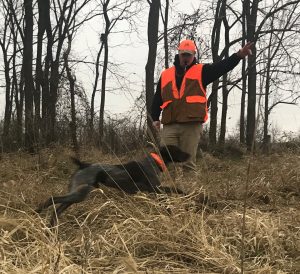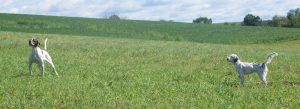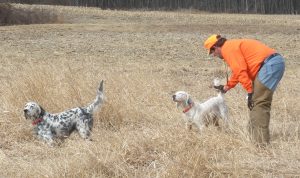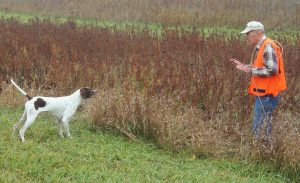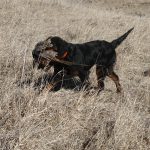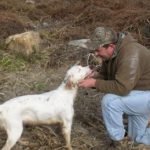POINTING DOG POINTERS: What’s Next?
By Bob and Jody Iler
For the past few months, we’ve been addressing problems that may come up in your started dog’s first season – issues related to handling, pointing, gun development, and retrieving. As you look ahead to the upcoming year and beyond, it might be a good time to take stock.
What’s next for you and your pointing dog? To help determine where you and your pup want to be in a few years, it may help to look more closely at three main levels of pointing dog training and development.
The Started Dog
There are several different definitions of the started dog, depending on who you talk to, but all have one thing in common. The started dog is at “level one” of the training spectrum, or “elementary school” level. We’ve always defined the started dog as one that is hunting and finding birds, pointing, “green broke” to the gun, and possibly retrieving (if a natural retriever).
We like to say that you can “pick up your shotgun and go hunting” with your started dog. But because your pup is a novice in that first hunting season, it’s a good idea to limit gunfire, other dogs, and hunters – and err on the side of less, not more. Keeping experiences shorter and positive helps that young dog to learn the ropes as the season progresses. Hunting pups for hours in a nonproductive area, in bad weather, with dogs that steal the show, and hunting companions that shoot too many times can diminish enthusiasm – or worse – cause hunting, handling, and gun problems.
Once your pup has successfully gotten through his first season and you’ve tweaked the issues we’ve focused on for the past few months, he’ll only get better as time progresses and experience grows. Many hunters are satisfied with the started dog level of training and enjoy years of hunting partnership with their dogs without any advanced training.
The Seasoned Dog
We might compare the seasoned dog to a high schooler in his level of training. As your young dog spends more time hunting at game preserves and then hunting wild birds, he will learn some things naturally through those experiences. He’ll become adept at tracking running birds, for example. He’ll learn to hunt the places where he often finds the birds – the “birdy objectives.” He’ll begin to mark a bird as it is shot. He’ll learn to use his nose and the wind in his quest for birds. As he’s hunted on wild birds, he’ll learn to tighten up and be cautious – and point solidly.
At this more seasoned stage, if you hunt your dog with another dog that is at his same level of development, the session will likely be a positive experience. This will teach your dog to work well with other dogs and may lead to successful “team” hunts. And if your young dog is a natural backer, he may learn to back another dog’s point as well.
If your dog has shown tendencies to retrieve in his first season, this will often increase and get better as he develops into a seasoned hunter. If he has shown no interest in retrieving, and retrieving is important to you, a seasoned dog that has been hunted for several seasons and is bird crazy may be a good candidate for learning the trained retrieve. This training requires plenty of time, patience and expertise. Pressure and the use of an e-collar are part of the process. We emphasize that this training should be done by a knowledgeable and light-handed trainer!
And speaking of the e-collar, if a seasoned and enthusiastic bird dog develops handling problems in the field, he’s at a level now where the e-collar can be introduced as an additional, learned reinforcement of what he has already learned about handling. Again, consult a trainer for some help in using this tool properly. We have seen some great dogs with lots of potential turned off by improper use of the e-collar!
The Finished Dog
The finished dog has all the attributes of a well-seasoned pointing dog but has also completed a challenging “college level” course of training, which must be maintained at that level and not allowed to backslide. Many advanced field events will require that your dog be steady to wing, or steady to wing and shot. They may also require your dog to honor (back) another dog, and to retrieve a bird to hand. This advanced level of training, like the trained retrieve noted above, requires patience, time, and commitment. Help from a pro trainer is recommended for this level of training, but with some guidance, you can accomplish this training with your seasoned dog.
Hunt tests and field trials offer different venues and levels for competition. Some field trials are handled on horseback, and in others (walking trials), handlers are on foot. In both, judges are on horseback so it pays to acquaint your dog with horses early on, if possible. Pointing dogs competing in junior, senior, and master hunter tests are judged against a standard for each level and qualify based on points toward that standard. Field trials offer competition between dogs at various levels of performance ranging from puppy stakes to all-age stakes, with placements for the top dogs in each. Shooting dog stakes and versatile dog competitions are other field events offered. Each have their own particular rules depending on the event and organization.
If you’re interested in competing in field events with your dog, check with a pro trainer who can help you determine if your dog fits the category that you’re interested in. Competing in field events can be a great way to spend more time with your dog and fine-tune his development.
Imagine – for a moment – a pointing dog coursing the field with excitement and sparkle, knowing the likely places to go to find birds. When he finds his first bird, he goes on point, intense and immobile. His handler approaches and circles around him to the front. The handler flushes the bird, lifts his gun, and shoots. The dog remains steady to the flight of the bird and to the shot as the bird comes down. His handler walks over and taps the dog on the head, signaling a retrieve. The dog runs out, picks up the bird, and retrieves it to hand. The well-trained dog that has the “eye of the tiger” – showing enthusiasm and drive in hunting – is the dog to watch!
Whether you want a reliable hunting partner to help you bring home the birds or are also interested in advanced training for field events, time spent with your pointing dog gives a lifetime of cherished memories.
Pointing Dog Pointers features monthly training tips by Bob and Jody Iler, who own Green Valley Kennels in Dubuque, Iowa. Bob and Jody have trained pointing dogs for over 35 years and have written many articles for Pointing Dog Journal.



